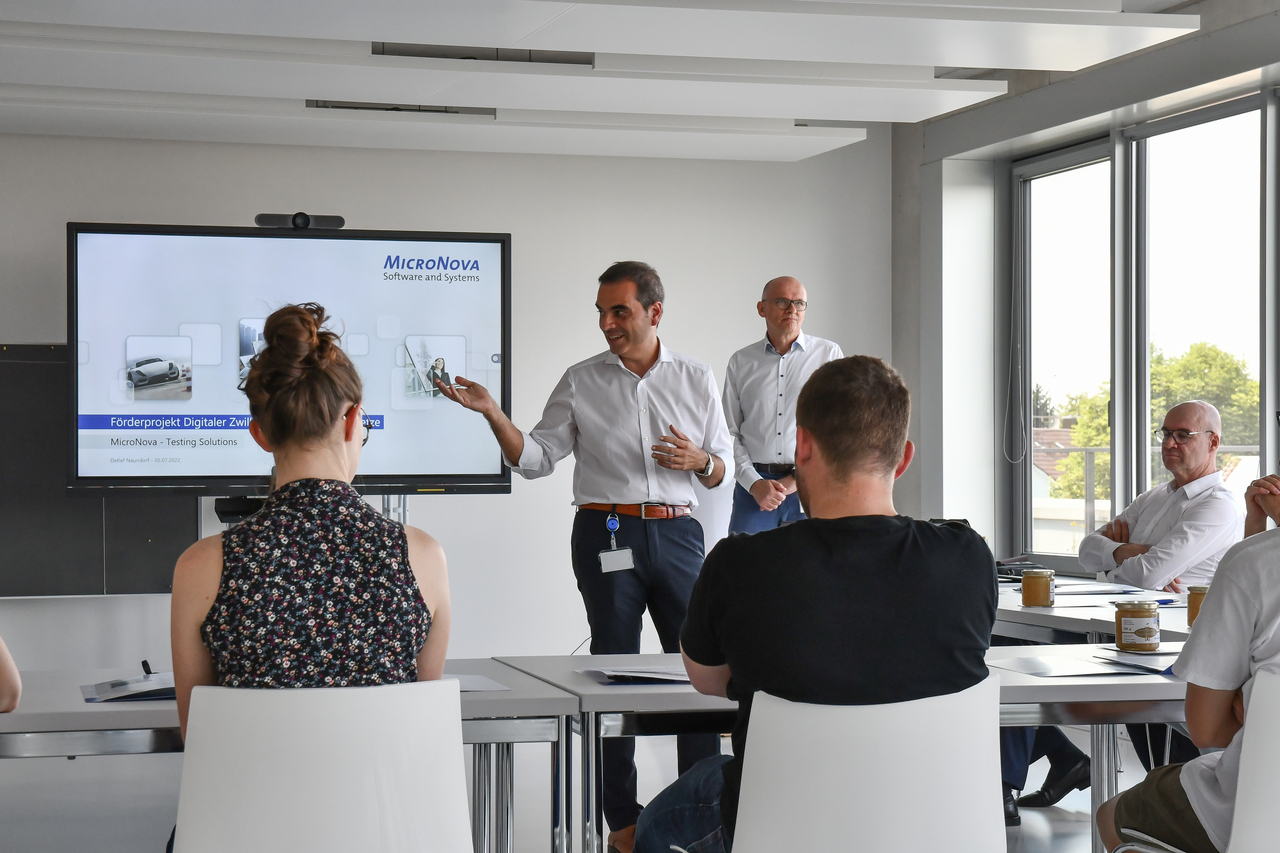Energy: science and industry exchange
Professors and students discuss innovation opportunities in the field of energy supply at MicroNova.
Whether climate or global politics - the energy supply is currently under scrutiny, especially in Germany, and is very likely to change significantly. On July 5, 2022 in Vierkirchen, teachers and students of the course "Regenerative Energies / Electrical Engineering" of the Munich University of Applied Sciences discussed the how with MicroNova representatives. The event was concluded with the visit of a nearby hydropower plant.
For many years now, MicroNova has been calculatory achieving CO2 neutrality: the founding family owns the aforementioned hydroelectric power plant in nearby Weichs, which generates around 300,000 kWh/a with an maximum power output of 60 kW. In addition, a photovoltaic system with over 40 kWp will soon be installed on the new company building. Together with a whole bundle of other energy-saving measures, MicroNova has already done a lot to reduce its carbon footprint - a topic that is attracting increasing interest in view of the challenges surrounding the global climate. In addition, there has recently been an increased focus on the issue of security of supply or the associated independence.

High-tech can make many valuable contributions to efficient energy production, distribution and use. The spectrum ranges from sensor-optimized power and heat production to intelligent distribution networks and smart building controls - and everything "in between" that measures, regulates and evaluates in the above-mentioned environment. The playing field for potential innovations is correspondingly large. In order to talk about such, students and teachers from the Faculty of Electrical Engineering and Information Technology at Munich University of Applied Sciences met for a constructive exchange of topics with the management board, supervisory board and experts from MicroNova.
Concrete projects and new ideas
The goals of the discussion between the current and future experts: mutual insights into the status quo of technology and energy supply as well as the discussion of ideas and possible business models with a special focus on an independent and sustainable production of electricity and heat. In this context, MicroNova presented, among other things, a funding project for a so-called digital twin that maps energy distribution networks in real time. With such digital images, real plants can basically be mirrored in virtual form, based on a bidirectional exchange of data; via this constant data flow, changes to optimize processes can be achieved very quickly. The potential applications are correspondingly diverse, especially in a granular distributed system like the power grid.
"In 2040, we will often have a large surplus of renewable energy for days and hours at a time," said Prof. Dr.-Ing. Simon Schramm, professor at the Faculty of Electrical Engineering and Information Technology at Munich University of Applied Sciences. "So we need smart solutions to be able to store electricity generated from this, in a way that serves the grid, and make it available again as needed. Munich University of Applied Sciences is already involved in this field in the course of some interesting spin-offs. Through these and directly, we are always happy to join forces with companies that have been successful on the market for many years. Together, we have a great energy mission ahead of us."
Apposite to that, another presentation explained projects of the company with a Spanish partner around the "Internet of Things" (IoT), which energy providers are already using to measure and control the power grid - according to Prof. Dr.-Ing. Schramm, the open platform used for this purpose, was a suitable "energy management system" for any larger industrial company to measure and optimize power consumption.
"For universities, closing ranks with industry is existential. After all, our objective is quite clearly to train the next generation of initiators for our country," adds Prof. Dr.-Ing. Wolfgang Rehm, Dean at the Faculty of Electrical Engineering and Information Technology at Munich University of Applied Sciences. "Visits like these are therefore particularly valuable. Because not only do we get insights as guests, but we can directly provide impulses at eye level with our students, who may even implement them themselves later."
Live impressions of renewable energy
The visit concluded with a tour of the hydropower plant in Weichs, the neighboring village to MicroNova's headquarters in Vierkirchen. There, the students were able to take a close look at the hydropower plant, which was completely renovated just a few years ago by MicroNova founder Josef W. Karl and features a Kaplan turbine as well as automated control system. With a maximum output of 60 kW, enough electricity is generated there around the clock to calculatory supply all MicroNova locations in a CO2-neutral manner. The visitors also inspected the weir system with fish ladder, which has also been renovated - there, as in the power plant room in the mill, an automatic control system has mostly replaced the time-consuming and strenuous manual regulation of the prescribed water level.
"Whether for electricity, heat or mobility: energy, as a central physical quantity, is everyday reality for all of us. Unfortunately, it is finite, which is why we need to use it more efficiently as quickly as possible," said MicroNova founder Josef W. Karl. "We firmly believe that technological innovations will make an important contribution here. There are already some interesting approaches in this area, and we ourselves already have several points of contact. It would be desirable if we can expand these activities even further, also in cooperation with universities. It's great to see the interest, especially among young academics."


